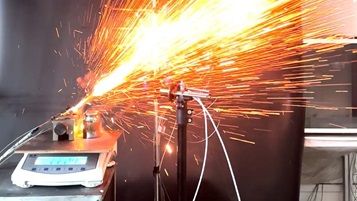According to the National Institute of Standards and Technology (NIST), researchers have developed an AI system that can detect the unique sound made by lithium-ion batteries before they catch fire. The AI listens for a specific “click-hiss” sound caused by the release of gas as the battery approaches thermal runaway.
Thermal runaway is a chemical reaction that occurs when a lithium-ion battery overheats or is damaged, potentially causing it to catch fire or explode. The AI detection system was tested in collaboration with researchers from Xi’an University of Science and Technology.
During the experiment, the AI system identified the sound of battery failure with a 94% accuracy rate.
The technology offers a new way to identify overheating lithium-ion batteries in settings where other detection methods, like smoke alarms, might not be effective. This research was part of a collaboration between NIST and a laboratory at Xi’an University of Science and Technology.
Researchers recorded audio samples from 38 battery explosions to train the algorithm, which then used more than 1,000 unique audio variations to improve its ability to distinguish battery failure sounds from other noises.
Wai Cheong “Andy” Tam, a NIST researcher, noted: “Right before the fire started, the safety valve in the battery broke and it made this little noise. I thought we might be able to use that.” He tested this idea with co-researcher Anthony Putorti, and their work confirmed that the click-hiss sound was distinct enough for detection.
In real-world applications, lithium-ion battery fires are especially dangerous because of the high heat and rapid ignition. According to the New York City Fire Department, there were 268 residential fires involving batteries in e-bikes in 2023, which resulted in 150 injuries and 18 fatalities. Traditional smoke alarms often fail to detect these fires early enough, as lithium-ion batteries release little smoke at the initial stages of failure.
The researchers believe that AI-based detection technology could be installed in settings with high lithium-ion battery use, such as homes, office buildings, and warehouses.
The system’s capacity to detect the sound two minutes before battery failure could offer a vital evacuation window in emergencies.
At the 13th Asia-Oceania Symposium on Fire Science and Technology, Tam presented their findings and highlighted the potential of this technology for future development.
He and Putorti plan to expand their testing across various battery types and experiment with different types of microphones. They are also seeking a patent for the technology to make it commercially viable in the future.
The researchers hope that this sound-based approach will add a layer of safety to environments where lithium-ion batteries are commonly used. Their ongoing work aims to refine the AI detection system’s accuracy and adaptability to ensure its effectiveness in diverse settings.








